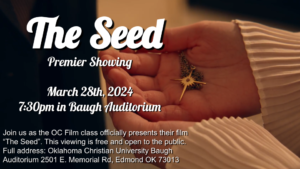
On March 2, 1955, a young Claudette Colvin refused to give up her seat to a white woman on a Montgomery, Alabama bus.
Sixty years later, the same woman, with the attorney who represented her, addressed the students of Oklahoma Christian University.
Civil Rights activists Colvin and Fred Gray spoke in Hardeman Auditorium on Monday as a part of the History Speaks lecture.
Multicultural and Service Learning Coordinator Gary Jones helped put together the History Speaks lecture.
“It has been a non-stop history lesson,” Jones said.
After walking to downtown Montgomery alongside classmates, Colvin boarded a bus at a stop across from Martin Luther King, Jr’s church. After riding, the bus became crowded with white citizens. It was then that the bus driver asked Colvin and three of her friends to give up their seats, designated for people of color.
Colvin said the other students reluctantly got up, yet she refused.
“I couldn’t get up because history had me glued to the seat… I was so intrigued by the story of Sojourner Truth and Harriet Tubman that it felt like Sojourner Truth’s hands were pushing me down on one side and Harriet Tubman’s hands were pushing me down on the other,” Colvin said during the lecture.
Colvin said she never expected her story to create an impact, but she just wanted the people on the bus to go home and tell their families that a young black girl did not obey an unjust segregation law.
After Colvin refused to give up her seat, she was taken to jail and needed attorney representation. It was at this time that her mother found Gray.
Gray said he cited Colvin as a major starting point for the Civil Rights Movement for him and said many events might not have transpired if it were not for Colvin.
“Mrs. Rosa Parks might not have done what she did on December 1, 1955… she wouldn’t have been arrested… she wouldn’t have been tried,” Gray said. “All of that happened because of what one young lady did when she was 15.”
Due to the upcoming 60th anniversary of the Montgomery Bus Boycott, Jones said he thought bringing in Colvin and Gray would be ideal.
“Claudette Colvin is not a story that a lot of people know, in recent years, it is becoming increasingly more known so we wanted to try to get her to campus,” Jones said.
Gray had spoken on campus at a commencement ceremony several years prior. However, because of his connections to Colvin, the university decided to bring him back.
“Claudette was my first civil rights case,” Gray said. “There’s always something about your first case and Claudette was my very first case.”
Gray said he began his career in law in order to help change some of the injustices he saw when he was a teenager.
“[My goal was to] destroy everything segregated that I could find,” Gray said.
Colvin left the audience with a charge at the end of her talk.
“I want the young people to keep the movement going on… if you see any injustices, speak up,” Colvin said. “Do not regress, keep on progressing.”













Be First to Comment